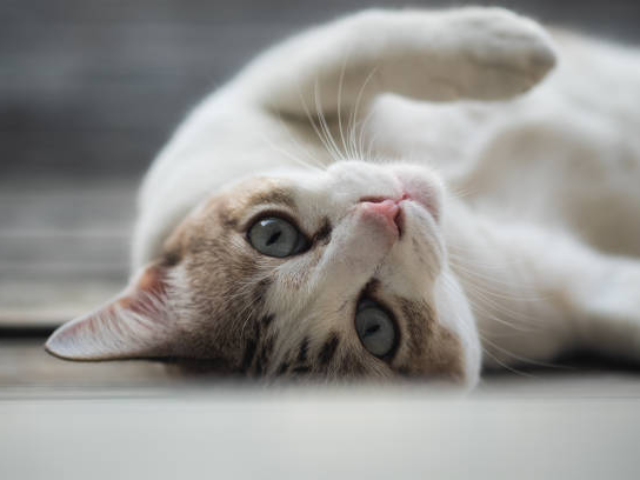Ever catch your cat with their tongue peeking out, looking like they forgot to finish a thought? Maybe it’s just a little pink tip sticking out, or perhaps, they’re full-on “blepping” at you. It’s cute and weird and makes you wonder, “Why do cats have their tongue out?”
Sometimes, it’s nothing to worry about, but other times, it’s a sign you should pay attention. Let’s find out the typical, the peculiar, and the times you should ask for the vet’s help.
Often, seeing your cat stick their tongue out is just part of their unique personality and daily habits. These moments add to their charm. Let’s look at some common, perfectly normal reasons.

It sounds fancy, but the Flehmen response is a natural cat behavior you might have seen. When they find an interesting smell, like another cat’s scent mark, they may slightly open their mouths to draw in air to help them get a better “taste” of the smell.
The air flows into the vomeronasal organ, a tiny organ located at the roof of their mouth. It helps them analyze scents more deeply than just sniffing through their nose.
When they do this, their upper lip might curl up, their mouth open a bit, and sometimes the tip of the cat’s tongue is out. It might look like a grimace or a sneer, but it’s just your cat being a super-sniffer! It’s a natural and fascinating part of how they understand their surroundings.

Cats keep their fur clean and tidy most of the time. Their tongues have tiny barbs called papillae that help remove dirt and loose fur.
Sometimes, after a vigorous grooming session, your cat might occasionally pause mid-lick. They could get distracted or take a brief break, leaving their tongue out for a moment before tucking it back in. If you notice your cat sticking their tongue out right after grooming, it’s usually a temporary pause in their routine. It’s quick and nothing to worry about.

Doesn’t your cat look peaceful when they’re fast asleep? When cats enter a deep sleep state, their entire body relaxes. Like our jaws might slacken when we’re deeply asleep, a cat’s jaw muscles also relax, causing their mouth to fall open slightly.
When this happens, the tip of your cat’s tongue is out. It’s pretty usual, which means they are incredibly relaxed and comfortable. So, if you spot a little tongue during nap time, just enjoy the cute sight—they’re likely having sweet dreams.

Felines investigate their surroundings using their mouths and noses. Sometimes, after licking something new, cats stick their tongue out for a second or two, like a different type of food, a new toy, or even your hand.
The reason is that they are trying to figure out the taste or feel of what they just licked. This little pause with the cat tongue sticking out is just a brief moment of sensory analysis before they carry on. It’s another one of those harmless quirks that make cats entertaining.
While a cat with their tongue out is perfectly normal, there are a few situations where it’s worth paying a little extra attention to why your cat sticks their tongue out. These reasons are usually not serious, but observing your cat’s behavior can help you understand what’s happening.

If a cat feels nauseous or their stomach is upset, they might show it subtly. Just like people might need to lick their lips or hold their mouth a certain way when they feel sick to their stomach, cats can do something similar.
Mild nausea can sometimes cause a cat to lick their lips frequently. It can look like their tongue is darting out and back quickly, or they might hold their mouth slightly open, which could appear like their cat tongue is out slightly.
Are they also licking their lips a lot right before or after you see the tongue tip? Do they seem a little less interested in eating than usual? If these signs are brief but your cat seems fine, it might just be a temporary tummy upset that passes on its own. Keep an eye on them, but don’t panic if it’s mild and doesn’t last long.

Cats can experience stress or anxiety for many reasons, even things that seem small to us, like a change in routine, a new piece of furniture, or loud noises. They can show stress in ways that aren’t always obvious.
Sometimes, an anxious, stressed, or scared kitty might hold their mouth slightly open, making it look like your cat has their tongue out. It’s almost as if they hold tension in their face or mouth.
If you see this, think about what else is happening. Look for signs like hiding more than usual, changes in how much they eat or drink, grooming themselves much more or much less, or changes in where or how often they use their litter box. If the cat tongue out seems to happen when they are in a situation you know stresses them, it could be due to their anxiety.

Very rarely, your cat might keep their tongue out or move it strangely because something tiny is bothering them in their mouth. Maybe there’s food stuck in their teeth, or a thin blade of grass is tickling the roof of their mouth.
If they keep their tongue out and seem to be trying to dislodge something, or if they are pawing at their mouth, something may be briefly stuck. They might be using their tongue to try and get rid of it.
If this behavior is persistent or your cat seems distressed or in pain, a quick, careful check of their mouth might be needed. However, be extremely cautious when looking in a cat’s mouth, as they can bite hard if they are scared or in pain. If you can’t see anything easily or your cat won’t let you look, it’s better to consult your vet rather than risk a bite or hurting your cat.
Besides the mild tongue-out antics mentioned above, watch for these red flags. If you spot any of these issues, it’s time to get serious.

Old, yucky teeth can make your cat hold their mouth differently. Gum disease or a rotten tooth can hurt so much that they can’t fully close their jaws. Foul breath, excessive salivation, or dropping food are additional indicators. Regular dental checkups can save your cat a lot of pain—and spare you the stink.

Cats don’t breathe through their mouths unless they’re overheated or panting after playing around. If you see open-mouth breathing or heavy panting with that tongue flopped out—and it’s not mid-chase—it could mean congestion from a cold or something worse. Sneezing, runny eyes, or lethargy next to the tongue out? Call the vet fast.

Persistent nausea causes cats to lick their lips or slightly open their mouths. If your cat is vomiting regularly, skipping meals, or dragging around like they’re half-dead, that cat’s tongue out is a cry for help. It could be anything from a bad diet to a serious internal issue. Don’t wait it out.

Unlike dogs, cats don’t pant much. If you catch fast breathing and a tongue out on a regular day, your cat might have heatstroke or even heart or lung problems. High heat, like a stuffy apartment in summer, can push them into dangerous territory. Give them enough water, shade, and cool spots to keep them cool during hot months.

Rarely, neurological disorders or systemic illnesses can cause odd tongue behavior. If none of the above fit, but your cat can’t stop splaying that tongue and seems off, wobbling, drooling, or confused, don’t guess. Get them checked pronto.

Knowing why cats have their tongue out is great, but knowing when to worry is even better. Here are the big warning signs that mean you should call your vet right away:

While you can’t prevent every potential issue, providing good preventative care can help minimize the risk of health problems that might lead to symptoms like a persistent cat tongue out.

So, why do cats have their tongue out sometimes? As you’ve learned, seeing a cat with their tongue out is just a cute or regular part of their day. It could be their way of smelling their surroundings, a brief pause after grooming, a sign of deep, relaxed sleep, or a reaction to try a new taste.
You now understand many common, harmless reasons why cats have their tongue out. These little moments are part of what makes your cat unique and often add to their charm.
However, you also know that this tongue-out antic could be a sign that something more is going on, from mild nausea or stress to more serious health issues like dental disease, breathing problems, or other illnesses.
The key is observation. Enjoy the funny moments, but pay attention to their behavior, too. Is your cat sticking their tongue out more than usual? Is this manner new? Are there any other signs that your cat is not feeling well? By watching your cat closely and understanding why cats stick their tongues out, you can better grasp what your cat might be trying to communicate.
If you have concerns about your cat’s health or behavior, consult your veterinarian right away. They are your best resource for ensuring your feline friend stays healthy and happy for years. Understanding your cat better is one of the many joys of sharing your life with them.

